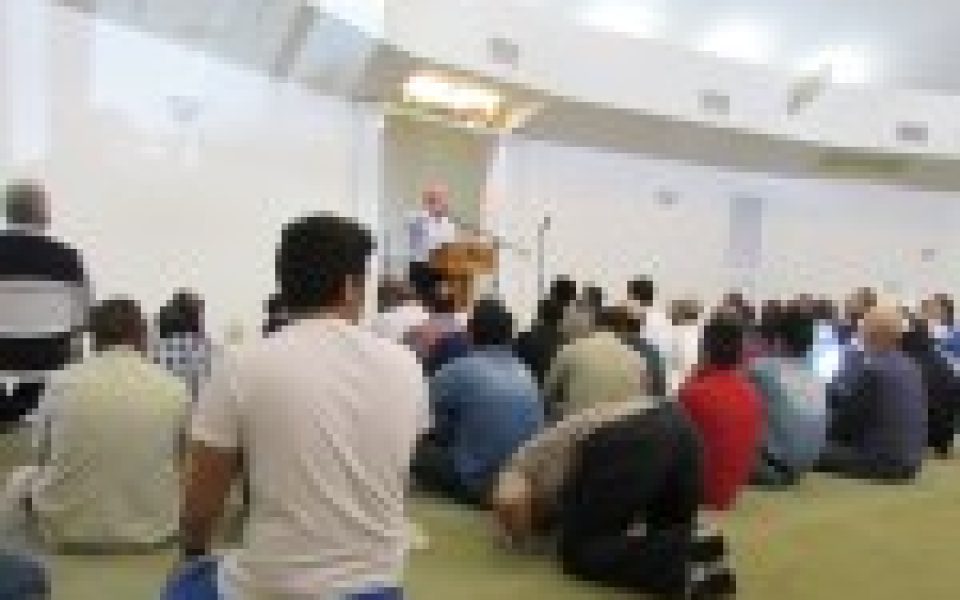Marie Davis stood out among the visitors who gathered in the annex of Annoor Islamic Center in Clemmons after Friday prayers.
Compared to others who either effused solidarity with their Muslim hosts — whose house of worship had come up as a topic during a violence-laden discussion among hard-right activists in Kernersville a week earlier — or framed their questions about the faith as delicate inquiries, Davis asked a succession of pointed questions in a tone with an unmistakably hard edge.
Nancy McKay chided Davis, a fellow Catholic.
“I feel that your body language and the tone of your questions were not from someone who really, truly wanted to know the answer, but someone who was trying to get a little angst going,” McKay said.
Davis had asked a string of questions that seemed calculated to embarrass her hosts: Does Islam allow Muslims to take more than one wife? (Answer: In some cases, if several criteria are met, yes, but the imam, Hamdy Radwan, had never met a Muslim man either in the United States or his native Egypt that had more than one wife, and himself had been happily married to the same woman for 35 years.) What is the difference between permanent and temporary marriage in Islam? (Answer: The worshipping community at Annoor, who are Sunni Muslim, do not recognize temporary marriage.) What about the practice of older men marrying young women? (The short answer: It’s an antiquated practice, and while it might have been culturally appropriate for a 17-year-old male to marry a 13-year-old girl in the agrarian past when children matured and took on adult responsibilities at a much younger age, it doesn’t make sense in the context of a modern society. And besides, Muslims follow civil law.)
Dina Shehata, a member of Annoor Islamic Center who recently earned a master’s degree from NC State University and hopes someday to work at the United Nations through the US State Department, seemed to relish the opportunity to share that she chose to wear the hijab of her own accord. When Imam Radwan slyly asked her if marriage was arranged, Shehata quickly responded, “I chose my own man!”
“All these misconceptions, all these problems that are happening,” Shehata said, “they would all be squashed if every single person were to meet a Muslim person, or somebody else from a different culture or country.”
Davis wasn’t done yet.
“All right, let’s squash another one then,” she said.
“Let’s do it,” Shehata responded gamely.
“If I were to insult the Prophet, would you issue a fatwa against me if you had the power?” Davis asked.
The question was really directed to the imam, who declined to answer.
“I will not ask you that question, ma’am,” Radwan said. “I will not ask you if I insult Jesus what you will do to me because I will never do that. I respect Jesus as the highest level of human being that ever existed on earth, exactly like the Prophet Mohammed. We have no difference between them; we have all respect to all of them.”
A woman named Monique dressed in a hijab, who said she joined the Army after Sept. 11, 2001 with “hate” and “misconceptions” about Islam, told Davis about her experience converting to the faith in 2015.
“What you feel — I’m very sorry that you feel this way,” Monique said. “I know how that feels. It’s a burden. But if you actually talk to us, take the time, and read, you will see that it’s not what you think it is. And we have so many similarities. I know my Bible; I was raised on it. There’s so many similarities.”
Having become the focus of multiple testimonials, censures and pleadings, Davis insisted on being heard one last time.
“Whoa, I am getting portrayed in a really bad light here,” she said. “I would like to feel welcome, but I don’t. However, I have no hatred for Muslims. In America, you are free to have your religion, to do what you want to do within the law. I have nothing to do with the people in Kernersville; don’t paint me there. Maybe you would respect my courage at least of standing here in front of a hostile group!”
“Absolutely,” one of the Muslim men responded, and the crowd broke out into applause.
As Radwan was calling the meeting to a close and directing the guests to a table laden with baklava in the corner, a girl in a hijab approached Davis, as if summoning the courage to speak, but soon she was convulsing in tears.
“Give her a hug,” one of the Muslim men urged.
The girl extended her arms, and Davis held hers briefly aloft before letting them fall on the girl’s back. She pulled the slender girl to her ample bosom, and a jumble of crossed signals played across her face — mortification, shame, even the slightest flicker of protective love.
Tell us your story:
Join the First Amendment Society, a membership that goes directly to funding TCB‘s newsroom.
We believe that reporting can save the world.
The TCB First Amendment Society recognizes the vital role of a free, unfettered press with a bundling of local experiences designed to build community, and unique engagements with our newsroom that will help you understand, and shape, local journalism’s critical role in uplifting the people in our cities.
All revenue goes directly into the newsroom as reporters’ salaries and freelance commissions.


Leave a Reply